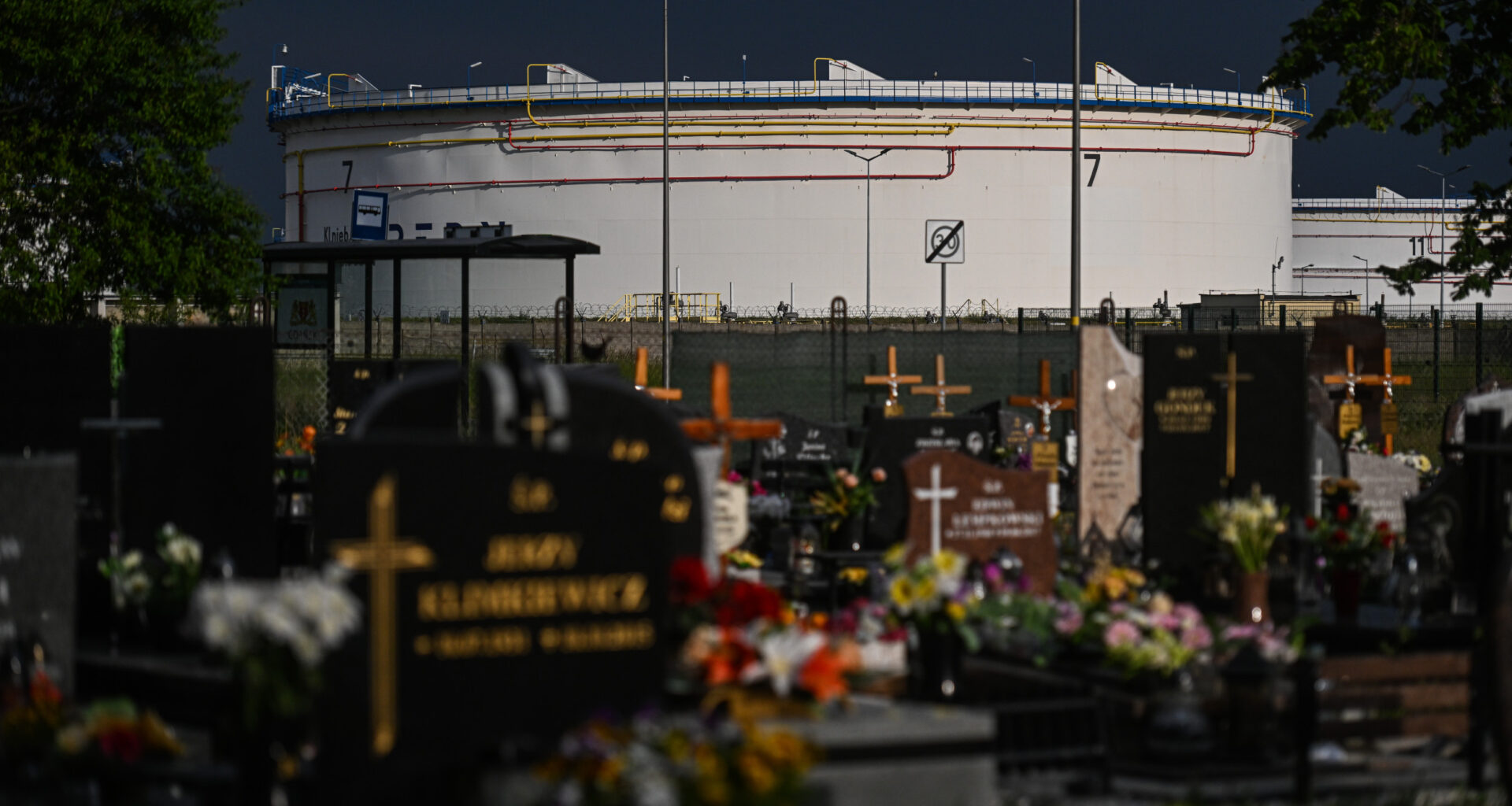The discovery in Poland of one of Europe’s most significant conventional oil finds in a decade has been welcomed as a step toward energy security in the NATO country.
Central European Petroleum (CEP), a Calgary-based company with Norwegian backing, announced the find at the Wolin East 1 (WE1) well, four miles from the Baltic Sea port city Świnoujście in the northeast of the country.
However, energy expert Thomas O’Donnell told Newsweek Thursday that the discovery was “not a game changer.”
Nevertheless, one think tank in Germany has warned that the discovery could come with substantial costs to tourism and environmental protection.
When contacted by Newsweek, the Polish foreign ministry referred to foreign minister Radosław Sikorski’s X post that said: “God probably really loves the (coalition) government.”

Crude oil tanks are seen near a cemetery a few dozen kilometers from Gdansk in Poland on June 6, 2022.
Crude oil tanks are seen near a cemetery a few dozen kilometers from Gdansk in Poland on June 6, 2022.
Omar Marques/Getty Images
Why It Matters
In a statement to Newsweek, CEP said that once the Wolin East deposit is officially confirmed it will be Poland’s largest oil and associated natural gas field.
With the potential to more than double Poland’s current estimated oil reserves, it will boost the energy security of a NATO member on the alliance’s eastern flank and diversify its fuel sources.
What To Know
CEP, which holds a 100 percent stake in the Wolin lease area, said it had made a significant oil discovery in the Wolin East 1 (WE1) well, about four miles offshore from the city of Świnoujście on the Baltic Sea.
Preliminary estimates suggest the site contains 22 million tons of recoverable crude oil and condensate, along with 5 billion cubic meters of commercial-grade natural gas.
These make it the most significant conventional oil discovery in Poland’s history and one of the most significant in Europe in recent years.
Berlin-based energy expert Thomas O’Donnell told Newsweek the site may produce up to 35,000 barrels a day which is “a fairly good sized well in Texas, but that’s not a game changer” amid estimates that this would provide five percent of Poland’s needs.
However, there could be further oil to discover and the find showed Poland’s commitment to find indigenous sources of oil and gas.
Poland is a net importer of oil and so the more it can produce itself, the more it will help with the country’s balance of payments. This has knock-on benefits in terms of the price of goods and curbing inflation, O’Donnell said.
Increased oil production offshore will also focus minds on how to protect energy assets in the Baltic Sea from sabotage, following a number of attacks blamed on Moscow recently, he added.
However, the German Institute for Economic Research (DIW) has warned that exploiting the discovery in Poland’s section of the Baltic Sea could come with substantial costs to tourism and environmental protection.
DIW researcher Claudia Kemfert said in a statement that any accidents would come with high cross-border clean-up costs and fossil energy extraction “runs counter to climate protection targets” and so “extraction therefore cannot be recommended.”
What People Are Saying
Rolf G. Skaar, CEO of CEP said in a statement: “We view this discovery as a foundation for long-term, responsible development of Poland’s offshore resources. Wolin East is more than just a promising field – it represents a shared opportunity to unlock the full geological and energy potential of the Baltic Sea.”
Polish Foreign Minister Radosław Sikorski said on X, formerly Twitter: “Sławosz flies to space, Iga wins Wimbledon, the EU predicts a ton of money for (Poland) and now this too. God probably really loves the KO-PSL-PL2050-Lewica (coalition) government.”
As well as referring to the oil discovery, the post also mentions Polish astronaut Sławosz Uznański-Wiśniewski and tennis player Iga Swiatek.
Energy analyst Thomas O’Donnell told Newsweek: “This is not a game changer, but as far as politics is concerned this shows Poland’s commitment to find oil and gas wherever it can.”
DIW researcher Claudia Kemfert said in a statement that the environmental costs “outweigh the benefits. Extraction therefore cannot be recommended.”
What Happens Next
Further geological documentation must be prepared, submitted, and approved before extraction can start.
Piotr Woźniak, former CEO of Polish oil and gas company Polskie Górnictwo Naftowe i Gazownictwo (PGNiG), told Euronews CEP will want to raise funds quickly and document the deposit so that it has full rights to it and the legal ability to exploit it.
However, there is also a potential environmental challenge from a German organization, Lebensraum Vorpommern, over concerns about the potential impact of gas extraction.
